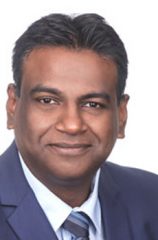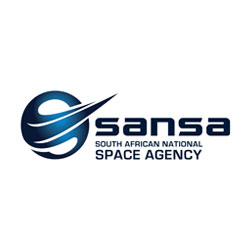In conversation with
Dr. Val Munsami
CEO | SA National Space Agency

FDI Spotlight: What was the motivation behind establishing a space agency for South Africa and why should a focus on space be place?
Dr Val Munsami: Firstly we need to go back a few years. At that point in time, we recognised that space is an enormous benefit to South Africa, for especially something like managing resources. For example, if you take photographs of South Africa from space at the same time every day, you can see any changes – which can give you significant data to work with. You are essentially measuring any change, which gives you what we call change detection.
There are four areas that can give you an idea of the significance of space: earth observation, accurate positioning of the earth for navigation, for example for using GPS trackers and systems, satellite communications and research and development.
For SANSA, the primary driver of developing a space programme was earth observation applications. In a nutshell, earth observation is gathering information about the planet’s physical, chemical and biological systems through remote sensing technologies. The data which is collected is analysed and can then be used for a wide variety of reasons.
For example, we can see the absorption spectrum of the sunlight of a leafy structure. Through the small blips on the images we can identify what type of plant it is. The blips also tell us something about the water content, in other words the amount of water in the plant itself.
Therefore this data is quite beneficial to precision farming, because farmers know more about their crops. In this way, space is important because the human eye cannot see what the satellites that take these images can see.
In terms of benefits to the economy, the amount of certain crops determine the market price; while farmers have their own formula for determining the number of crops in a field, a much more accurate number can be given due to satellite images. Therefore the danger of farmers over or under estimating productivity is lowered significantly and tells us that there is economical potential in satellite applications.
Are these applications exclusively in South Africa or are they being developed worldwide?
Dr Val Munsami: People around the world have tried to develop these applications to work in the ways we want or need it to, but no one is quite there yet. The big challenge is that even though the information is there, we need to figure out how to package it and bring it into the public domain.
The value proposition of space applications is incredibly vast and is so fundamental to managing the environment and looking at how we can improve productivity and efficiency; however, we need to ask ourselves how we can get the information to the farmer in the best way. This is what we are working towards at the moment.
What would you say is the vision for SANSA for South Africa the next few years?
Dr Val Munsami: We are currently reworking the vision for SANSA and I myself am working on a new strategic focus. Our goal is for South Africa to be the leading innovator of space science and technology applications for Africa and beyond.
In terms of the new focus, investment into this sector – especially research and development – is vital. Investors can be confident because we are not only looking at South Africa but at the African continent.
The National Research Foundation has said that in spite of efforts being made to collaborate and partner with international companies, the approach is fragmented and lacks coordination and synergy. In terms of your new strategic focus, how are you addressing this?
There is the Science Technology Innovation Strategy for Africa (Stisa 2024), which is a 10 year plan developed in 2014, and is the first leg in the science and technology sector of the Agenda 2063 of the African Union.
Stisa 2024 was originally developed to map out the science and technology landscape in Africa and to give us an idea of what we need in terms of infrastructure, education, human capital and how we can get certain flagship programmes off the ground.
However, the problem is that we are still waiting for the implementation plan to be approved. We are not sure why this is, but we do have the backing and the buy-in. For us, the idea is now to figure out how we can capture this opportunity and move this forward.
Therefore a key part of SANSA’s new strategy is how we can position ourselves, as a national space agency, to grow and develop science and technology not only in South Africa, but also across Africa.
In terms of education, development of skills and developing quality human capital, what do you think SANSA can do?
Dr Val Munsami: There definitely needs to be more of an effort in not only developing engineering, mathematics and science education and skills, but we need to work at improving the existing quality on the African continent. I firmly believe it is the agencies, such as space agencies, that need to take ownership in turning the current situation around. We cannot sit back and say that it is solely the responsibility of the Department of Basic or Higher Education – there needs to be a partnership between the two.
What is especially important is using the latest devices and technologies, such as iPads, tablets, phones and computers, to motivate and excite kids about science, technology, engineering and mathematics.
The fact of the matter is that we do have a problem in South Africa in terms of quality of skills and knowledge in those areas; however, there are many opportunities and possibilities for improving this. Space is one platform we can use to do this and it has a big role to play in education.
In terms of the Department of Science and Technology, there is a lot of support to make South Africa the foreign direct investment destination (FDI) of choice. While South Africa is seen as an innovative country across most – if not all – sectors, what is SANSA doing to attract FDI and cement South Africa as the best option for investing in Africa?
At the moment we have a number of partnerships in terms of science and technology and especially in terms of space. We have supported Russia in terms of space programs and they have become a big partner for us.
From South Africa we provide a number of services to international space missions and agencies, especially when it comes to launching a three stage rocket from America. There are three stages to this type of launch and by the third stage the rocket is over Africa. However, it cannot be seen by the American agencies. The satellite being released by this rocket also needs to be turned on and tested – that is where we come in.
Even though this brings in FDI, there is so much more that can be done. I believe that this is where we have to make it clear that even though there are a lot of fingers going into Africa, the continent is not a collective capture. From a South African perspective, we need to capitalise on our expertise, cultural knowledge, infrastructure, and existing and natural position and structure.
The investment going into Africa at the moment does not benefit the continent, the individual countries and the development of Africa in most ways. South Africa needs to take ownership in this aspect, especially from a space agency point of view, and work with these international agencies and investors to form partnerships.
